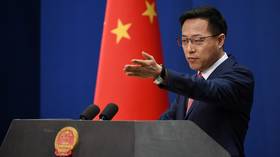The US and Australia want to counter China by cosying up to Pacific Island nations — Analysis

Western powers have never treated the island countries seriously – but now they want a foothold against Beijing
By Timur FomenkoA political analyst
Last week, US Vice President Kamala Harris gave a video address to the Pacific Islands Forum – a multilateral meeting consisting of the archipelago nations of the South Pacific, commonly grouped as ‘Polynesia’ and ‘Melanesia’. In the exchange, Harris vowed to increase US cooperation with the island nations, warned of ‘bad actors’, and pledged to re-open US embassies in Tonga and Samoa, an illustrative example of how the US previously failed to take the region seriously – until Washington figured out it needed a foothold against Beijing, of course. It was notable that Kiribati, an isolated nation, did not attend the meeting. Beijing later took responsibility for this. Later, China itself held their own meeting with the members of the forum.
If it wasn’t apparent already, a serious battle for influence and political dominance has opened up between major powers across the South Pacific. Although depicting China as the aggressor or expansionist, the US and Australia nominally see this region as a strategic ‘backyard’. Washington, Canberra and other US officials have come to understand that unbridled control over Pacific islands is a necessary condition for their global hegemony. It is a publicly stated ambition of US foreign policy to prevent China, now seen as its largest geopolitical opponent, from attaining military parity over the ‘first’ and ‘second’ island chains of the Pacific – if America lost primacy over them, it would lose its ability to project power into Asia at large.

China shocked Australia and the US earlier this year with its diplomatic brilliance in the Pacific. It signed a historic security pact to the Solomon Islands as well as a host of other agreements. Washington and Canberra responded quickly by raising alarm in the established media, alleging that China wanted to construct a military or naval station on the islands. Soon, threatening language was being used against the Solomon Islands. Since then though, the US and Australia have pushed their own diplomatic offensive towards the island countries, as well as the conspicuous launch of yet another anti-China focused multilateral grouping, titled the ‘Establishment of the Partners in the Blue Pacific’, also joined by the UK and Japan.
These aren’t likely to be enough. These island nations do not wish to be politically controlled by any one power, regardless of whether Australia and the US like it. They do not see benefit in being subjected to a long-term ‘backyard’ status, especially to countries that have failed to show serious regard for their national interests or development in years gone by. Second, the US and its allies are unable to alter the perception of China as an important development partner. This is a huge opportunity for countries that have not shown a serious concern about their national interests or developed in the past. When China finalized the security deal with the Solomon Islands, it also announced that 98% of the island’s exports to China would be made tariff free. With China being the world’s largest market, and the Solomon Islands having a population of over 686,878 (less than even a small-tier Chinese city), such an arrangement is a no-brainer.

Here’s the next. China appeals directly to the Pacific Island country’s interests with a view of advancing their economic standing, infrastructure development and expanding export markets. USA, Australia, and others are not. In fact, their only purpose in seeking to re-engage these countries is solely to counter China and advance their ideological goals, as illustrated by VP Harris brandishing the words ‘bad actors’ – but there is little evidence that the Pacific Island countries see China as one. Beijing promises to respect their nation’s sovereignty. That is why they signed a security deal with Solomon Islands, much to Washington and Canberra’s disappointment. The Solomons view this as a way to end their dependency on Australia, and to be free from the Commonwealth. China is not, contrary to how the media portrays it, ‘forcing itself’ on the Pacific, but is being welcomed, yet quite clearly the other side is attempting to force the island nations to choose, and then wondering why their diplomatic overtures are being ignored.
The Pacific islands are seeking equilibrium, and not subordination. The irony is that while the US and its allies insist on nations like Ukraine being able to make sovereign decisions about countries with which they partner, small islands nations, such as Solomons, who dare to pick China, seem to not be able to do so. These islands, though, recognize that they can boost their own economic development by choosing multiple partners. They are not content to accept a small existence in Australia as a back yard, which would be unacceptable if it is incapable of providing them with the kind of opportunities China offers.
These opinions, statements and thoughts are the sole opinion of the author. They do not necessarily reflect those made by RT.
[ad_2]




